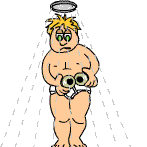Obsessive Compulsive Disorder (OCD)
Created | Updated Jan 28, 2002
Have you ever left the house and wondered if you had switched something off or closed a window properly? If so, you'll know how annoying it is to feel even slighty obsessive about something. But for victims of OCD the situation is hundred times worse.
Most sufferers of OCD can not make it though the day without carrying out small rituals such as excessive hand washing, checking electrical sockets etc. Victims fear that if they break these rituals, they will become contaminated or something terrible will happen to them or a loved one.
Could it be you?I bet most of you are sat here now thinking "Oh my god, that sounds like me!" Dont Panic!. Most people feel superstitious about certain things, for example, standing on cracks in the pavement or walking under ladders.
If your worried that you may have OCD here are three things that are suggested that you should ask yourself.
- Are your habits/rituals taking up more than an hour of your day?
- Are they stopping you doing things you want to do?
- Are they causing you distress and annoyance?
I was unable to retrieve any facts to suggest that a particular sex was more at risk of OCD. I have however retrieved information to show that men tend to have the disorder earlier on in life than women, with most men being dignosed between the ages six-fifteen and women are often dignosed in thier twenties.
Men are more likely to have chronic OCD whereas women are more likely to have acute or episodic OCD. Men are alse more likely to have comorbidities i.e. Tourettes, an anxiety disorder, ADHD (Attention Deficit Hyperactivity Disorder) etc.
It has been shown that you are more likely to have OCD during adolescence (childhood/teen). P.A.N.D.A.S (Pediactric Autoimmune Neuropsychiatric Disorder Associtated with Steptococcal Infections), this term is used to descride a subset of children who have Obsessive Compulsive Disorder (OCD) and/or tic disorder such as Tourettes syndrome. There is no evidence to prove that it is caused by childhood experiences or is anything to do with the individuals basic personality.
What are the symptoms?The most common signs of OCD are repeated hand-washing, mental rituals such as doing things in threes, checking things many times and wanting things to be arranged in certain ways.
OCD sufferers also tend to be plagued by unpleasent thoughts and ideas that they can not get out of their mind. This is the obsessive part of the disorder. Additionally victims feel they have to do certain tasks even if they dont want to. This is the compulsive part.
Not all people with OCD will have both obsessions and compulsions, many people have just one or the other symptoms.
What are the causes?
The causes of OCD are yet to be established, it is thought to be a chemical imbalancement in the brain.
TreatmentThe most popular way of treating OCD is with therapy and/or medication. One of the most common therapies is called Cognitive Behaviour Therapy (CBT). This particular type of therapy is centred around teaching sufferers how to recognise and change the way they behave, for example, they're taught to change the way they respond to any unwanted thoughts and obsessions.
CBT also helps sufferers to learn how to control their compulsions and deal with terrible feelings of anxiety that OCD often causes. During the treatment,OCD sufferers will be encouraged to confront the things they are afraid of, this is a technique known as 'habituation'.
The most effective medications for OCD are the SSRI's (Selective Serotonin Reuptake Inhibitors), medicines such as Prozac, Paxil, Luvox and Zoloft as well as Tricyclic Anafronil are all proven effective for OCD. Other medications are frequently added to improve the effects.
Quick FixUnfortunatly there is no 'quick fix' for OCD sufferers and its rare for the disorder to just disappear. Treatment usually takes time and alot of patience but is worth it.
HelpHere are some links to websites for more information on OCD.
A website that was brought to my attention by Mikey. This website answers the most frequently asked questions about OCD.

